Key takeaways
- A musician portfolio is a curated collection that showcases your work, style, and personal story.
- Collaboration enhances creativity and personal growth by blending diverse ideas and influences.
- Key skills for successful collaboration include effective communication, flexibility, and active listening.
- Building relationships and networking are essential for aspiring musicians to foster opportunities and creativity.
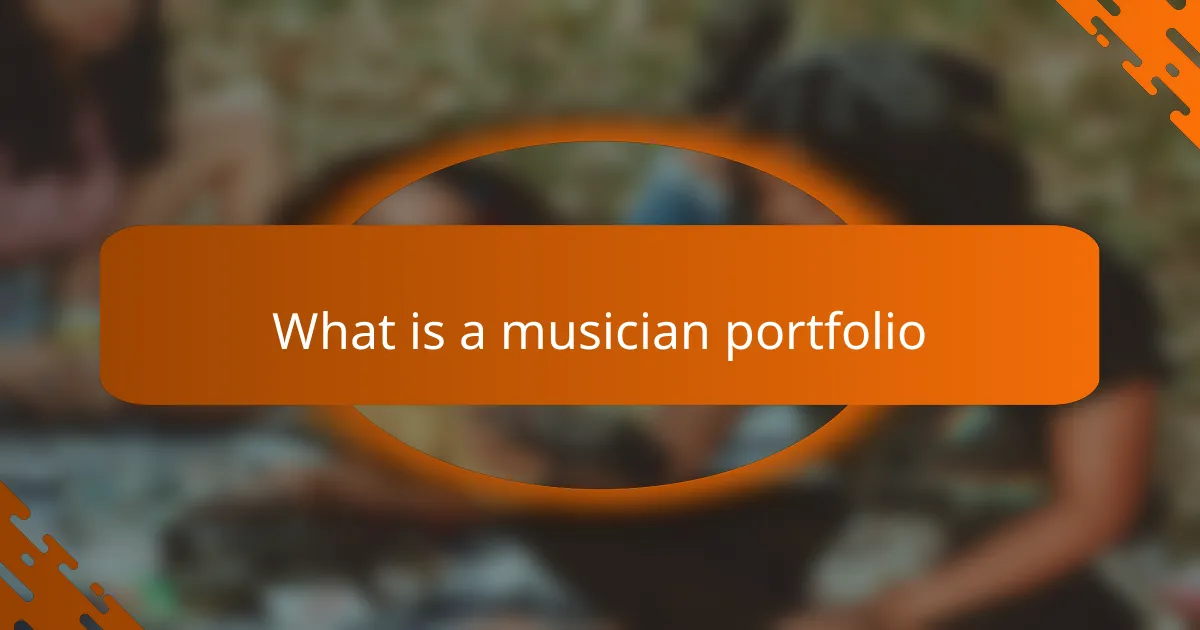
What is a musician portfolio
A musician portfolio is essentially a curated collection of your work and achievements that showcases your style and skills. I remember when I first compiled mine; it felt like assembling a scrapbook of my journey—each piece of music, every gig, and even those moments of inspiration became tangible representations of who I am as an artist.
Creating an effective portfolio isn’t just about listing accomplishments; it’s about telling your story in a way that resonates with others. For instance, when I collaborated with Taylor Swift, I learned the importance of highlighting not only the technical aspects of my music but also the emotions and experiences behind them. This personal touch can help others connect with your artistry in a meaningful way.
- A collection of your best work (audio, video, and written materials)
- Recent performances and collaborations
- Background information about your style and influences
- Testimonials or reviews from other artists or industry professionals
- Contact information and links to social media and streaming platforms
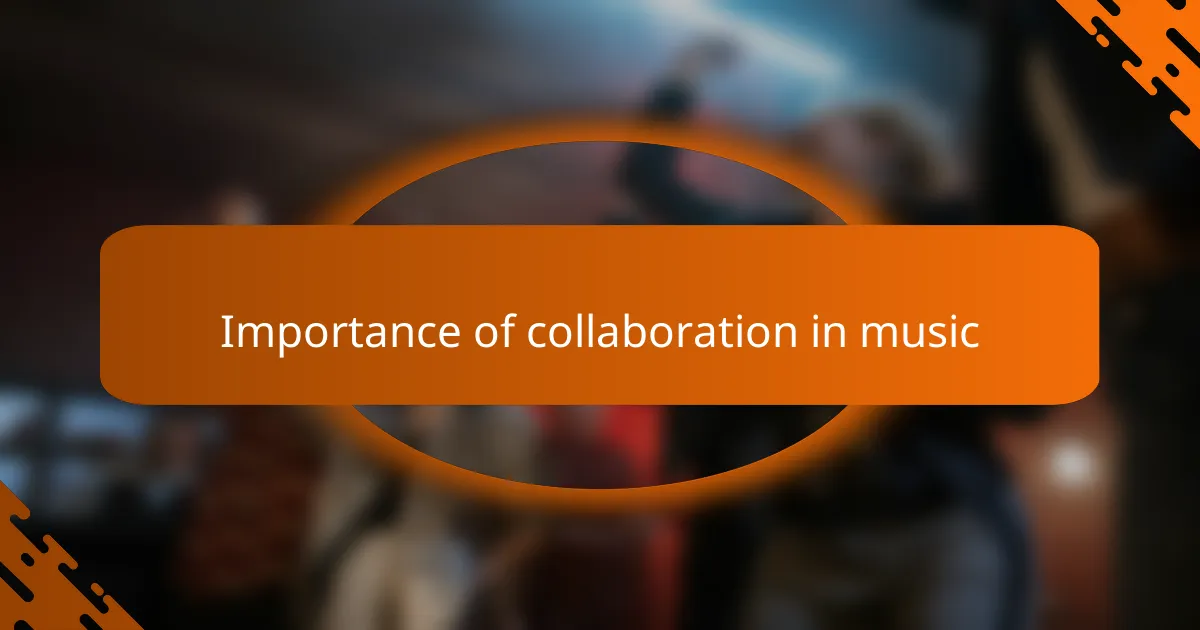
Importance of collaboration in music
Collaboration in music is essential because it often leads to the blending of unique styles and ideas. I’ve experienced this first-hand when working with Taylor Swift; our different backgrounds and artistic approaches ignited a creative spark that I hadn’t anticipated. Isn’t it fascinating how two distinct voices can come together to create something entirely new?
Another aspect I’ve noticed is that collaboration can push musicians out of their comfort zones. I remember feeling challenged when Taylor brought in her fresh perspective on a song we were crafting. It motivated me to explore new rhythms and melodies that I wouldn’t have considered alone. How often do we miss out on growth just because we don’t embrace outside influences?
Moreover, partnerships in music foster a sense of community and support. Being surrounded by fellow artists creates an encouraging environment where ideas flourish, and collaboration becomes a powerful tool for personal development. Reflecting on my collaborations, I realize that these moments have not only expanded my musical repertoire but also deepened my connections with other artists—something invaluable in this industry.
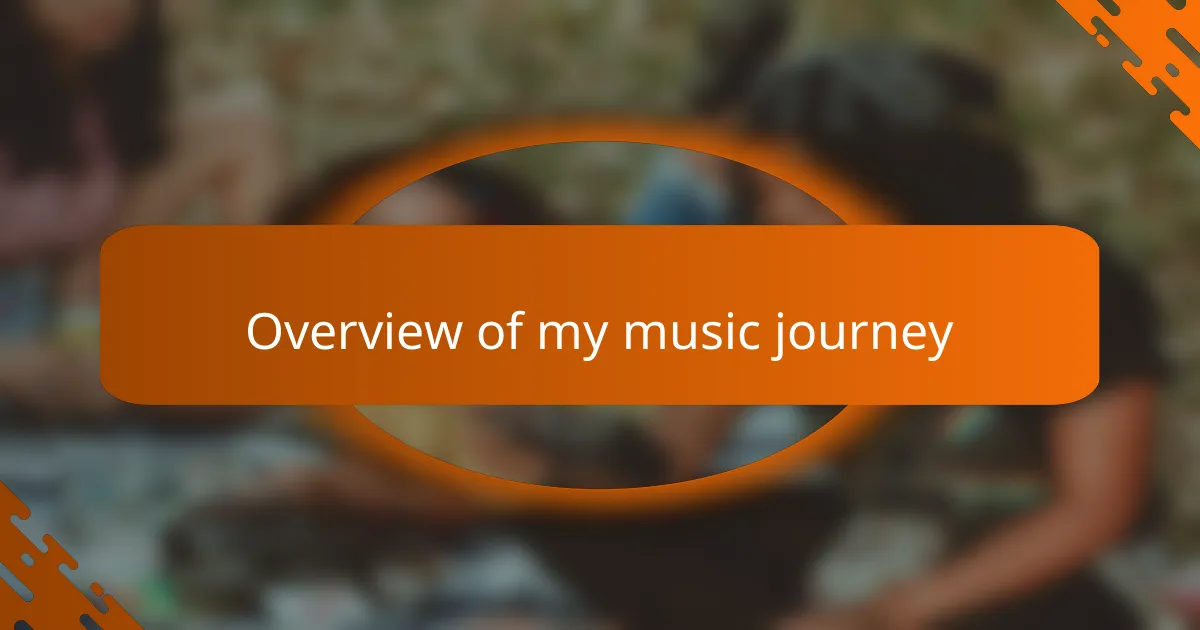
Overview of my music journey
My music journey has been nothing short of transformative. From a young age, I immersed myself in various musical styles, which fueled my passion and shaped my artistic identity. I remember nervously performing at local open mics, where each note played resonated deeply, pushing me to hone my craft and embrace my unique sound.
Looking back, I see how every collaboration and experience contributed to my growth as a musician. Whether it was writing in my bedroom or sharing stages with talented artists, each moment brought invaluable lessons that prepared me for larger opportunities, including my time collaborating with Taylor Swift.
- Began writing songs at age 12, inspired by personal experiences.
- Performed at local venues, allowing me to connect with my audience.
- Collaborated with various artists, enriching my musical perspective.
- Developed a unique style influenced by pop, folk, and indie genres.
- Excitedly prepared for a collaboration with Taylor Swift, which elevated my career.
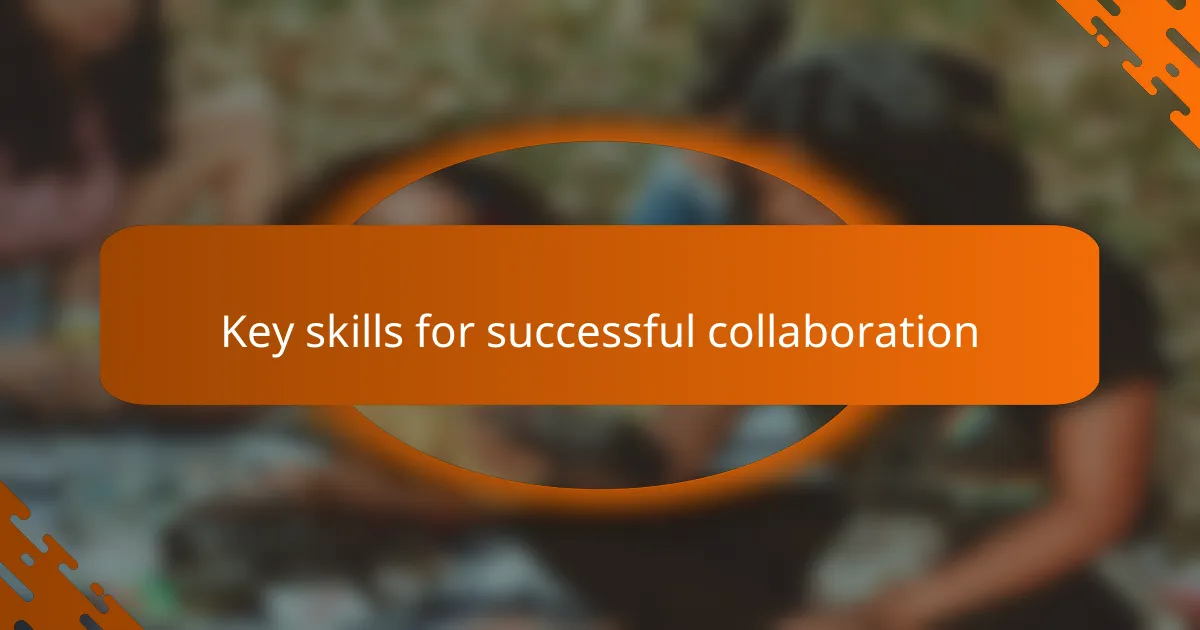
Key skills for successful collaboration
When collaborating with a high-caliber artist like Taylor Swift, certain key skills emerge as essential. Effective communication stands out as the cornerstone of our collaboration. I remember one instance when we were brainstorming lyrics. As we exchanged ideas, I felt the synergy of our thoughts come alive. It was thrilling to see how a single phrase could morph into something powerful through open dialogue.
Flexibility is another crucial skill. Creating music is an ever-evolving process, and I learned to adapt to Taylor’s artistic vision while still staying true to my own style. I vividly recall a moment when one of my initial ideas differed from what she envisioned. Instead of holding onto my original concept, I embraced her perspective, and it eventually led to a richer song that resonated deeply with both of us.
Here are some key skills for successful collaboration:
- Effective Communication: Share ideas openly to foster creativity.
- Flexibility: Be willing to adapt and evolve your concepts.
- Active Listening: Understand and value the perspectives of your collaborators.
- Confidence: Trust in your abilities and share your input without hesitation.
- Empathy: Connect emotionally to better understand your partner’s vision.
- Problem-Solving: Approach challenges as opportunities for innovation together.
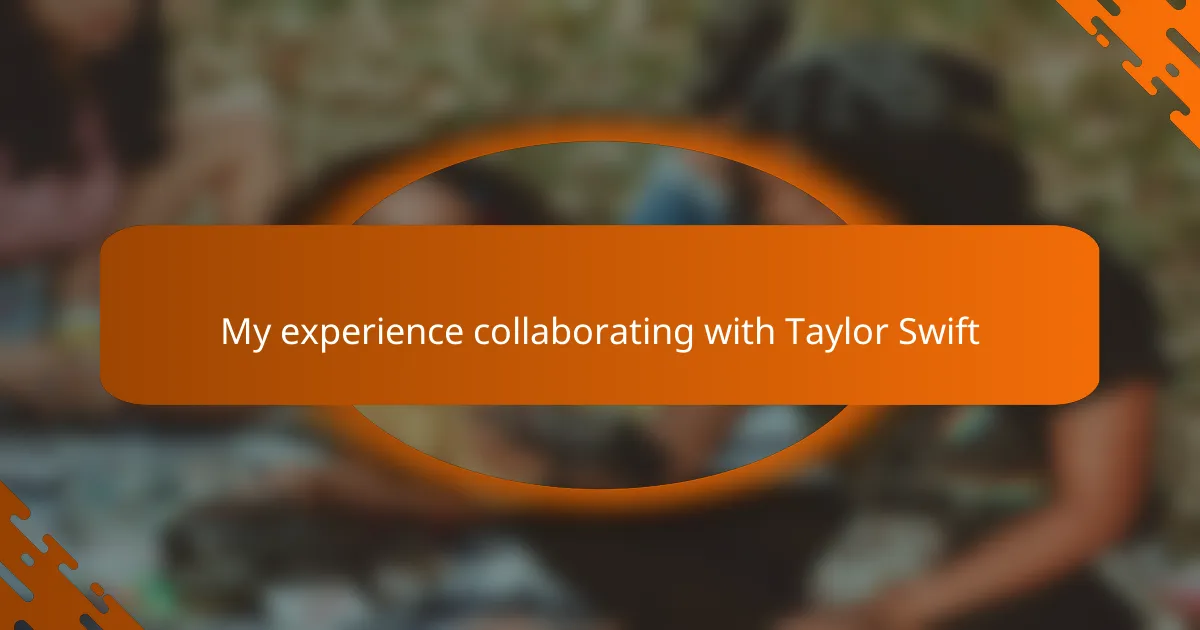
My experience collaborating with Taylor Swift
My experience collaborating with Taylor Swift was like stepping into a dream. I remember the first time we met; I was both excited and nervous. Would my style mesh with hers? As we began to work together, I quickly realized that our creative energies complemented each other, resulting in a process that felt both natural and exhilarating.
One specific moment stood out to me. We were in the studio, bouncing around ideas for a chorus. I suggested a melody that I thought was strong, but Taylor had a slight tweak in mind. When I heard her version, it struck me how just a few adjustments could elevate a piece to new heights. It made me reflect on how collaboration pushes us to think beyond our own perspective—hasn’t everyone had those “aha” moments when another’s insight shines a light on a better path?
Looking back, I feel incredibly grateful for the opportunity to work with someone of Taylor’s caliber. She wasn’t just a collaborator; she inspired me to dig deeper into my own emotions and convey them more authentically. Each session with her not only shaped the music we created but also left an imprint on my own artistic journey, an experience I cherish profoundly.
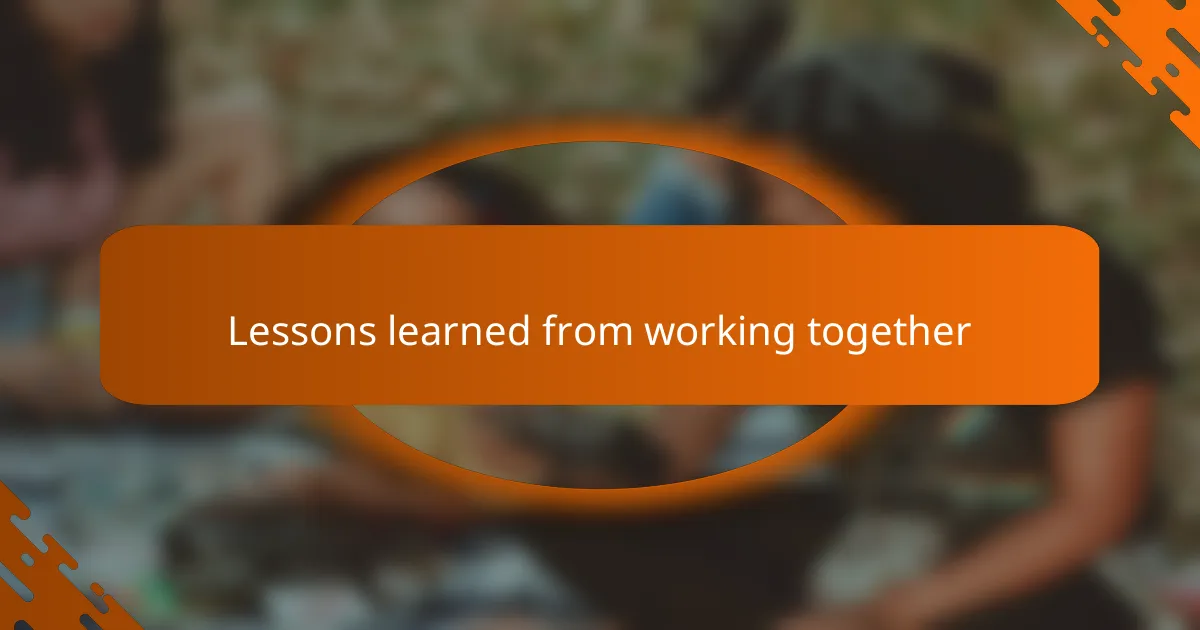
Lessons learned from working together
Working alongside Taylor Swift was more than just a professional collaboration; it taught me invaluable lessons about creativity and resilience. I remember one late night in the studio, as we hashed out the intricacies of a song’s lyrics, how her unwavering commitment to authenticity inspired me to dig deeper into my own artistic expression. It reminded me that vulnerability can be a strength, not a weakness.
One of the most significant takeaways was the importance of collaboration itself. Taylor’s willingness to merge her ideas with mine resulted in a richer final product. It opened my eyes to how collective creativity often leads to unexpected and beautiful results.
- Embrace vulnerability; it can transform your artistry.
- Collaboration enriches creativity and promotes growth.
- Stay open to feedback; it can elevate your work beyond expectations.
- Don’t shy away from late-night brainstorming sessions—they can spark brilliance.
- Celebrate the differences in styles and perspectives; they can lead to unique outcomes.
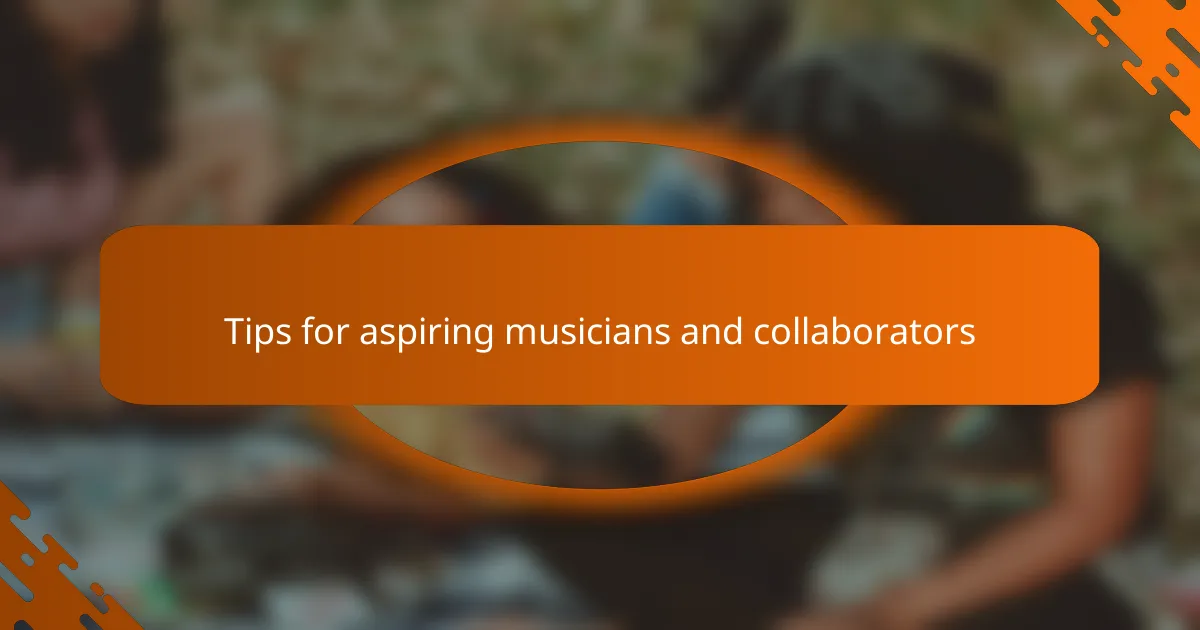
Tips for aspiring musicians and collaborators
When I think about collaboration, I remember my early days in music, where every connection felt electrifying. Building relationships is key—don’t shy away from reaching out to artists you admire. I once sent a simple message to a fellow musician, sharing my thoughts on their work. That led to an unexpected jam session that fueled my creativity and passion.
To pave your way as an aspiring musician or collaborator, consider these tips:
- Network Thoughtfully: Attend local shows or workshops to meet other musicians.
- Be Open-Minded: Embrace different genres and styles; you never know what collaboration could spark.
- Share Your Work: Use social media to showcase your music and connect with others.
- Be Authentic: Authenticity resonates more deeply than trying to fit a mold.
- Listen Actively: When collaborating, really listen to ideas. Great music often comes from synergy.
- Stay Persistent: Rejections can be tough but stay motivated; every ‘no’ brings you closer to a ‘yes.’